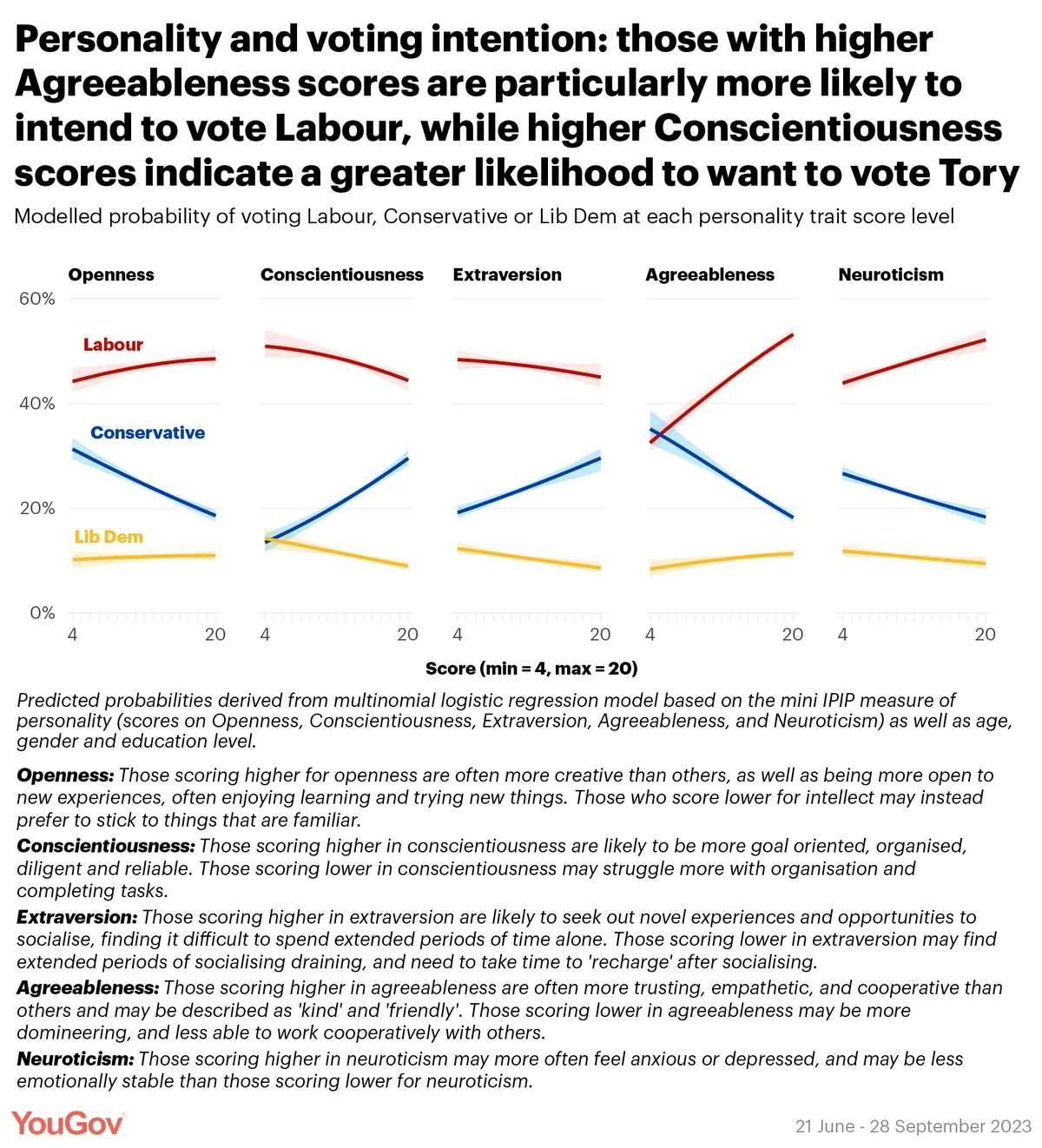YouGov models voting intention across OCEAN personality traits
Political scientists, pollsters, strategists and journalists often write of the role of a politician’s personality in their electoral success. However, less often do we consider how the personality of voters predisposes them to take one side or another on political issues, or indeed vote one way or another.
Personality seems at first glance to be a pretty nebulous term. What do we really mean when we talk about someone’s personality? Is it how funny they are, their confidence, perhaps even related to their intelligence?
This has been the focus of a great deal of research in psychology and this is not likely to stop any time soon. However, psychologists now tend to agree that an individual’s personality can be quantified across five overarching traits, namely Openness, Conscientiousness, Extraversion, Agreeableness and Neuroticism, or OCEAN for short. These five traits are known as the ‘big five’ and are described below.
To examine what role the big five are playing in voting behaviour currently, we used a shortened measure of the big five developed by Donnellan and colleagues in 20061 that has been well validated in psychological studies. For each of the five traits, respondents can score a minimum of four and a maximum of 20.
We asked respondents to complete this measure, and asked our normal voting intention question, ending up with a sample size of nearly 15,000 people. We then used a technique called multinomial logistic regression to understand how the probability of respondents’ current voting preference being each of Labour, Conservative and Liberal Democrat varies by their score on each personality trait. To account for other things that are known to be related to both personality scores and voting preferences, we entered several other characteristics – including age, gender and education – into the model, to control for any relationship these may have with personality traits.

Openness
Those scoring higher for Openness are often more creative than others, as well as being more open to new experiences, often enjoying learning and trying new things. Those who score lower for Openness may instead prefer to stick to things that are familiar.
Those intending to vote Conservative on average tend to score lower for Openness than those intending to vote Labour and Lib Dem at the next election. Our multinomial model predicts that in around 31% of cases those with the lowest score for Openness will vote Conservative, decreasing to 19% for those with the highest possible score.
Conscientiousness
Those scoring higher in Conscientiousness are likely to be more goal oriented, organised, diligent and reliable. Those scoring lower in Conscientiousness may struggle more with organisation and completing tasks.
The multinomial model predicts that those scoring higher in Conscientiousness will be much more likely to intend to vote Conservative than those scoring lower for the trait. For those with the lowest possible score for Conscientiousness, around 14% will vote Conservative, compared to 30% for those with the highest possible score for Conscientiousness. The model also predicts that the proportion voting Lib Dem will decrease with greater Conscientiousness, from 16% at the lowest possible score, to 8.5% at the highest possible score.
Extraversion
Those scoring higher in Extraversion are likely to seek out novel experiences and opportunities to socialise, finding it difficult to spend extended periods of time alone. Those scoring lower in Extraversion may find extended periods of socialising draining, and need to take time to 'recharge' after socialising.
When it comes to Extraversion, those scoring higher are more likely to vote Conservative. The model predicts that about 19% of those with the lowest score for Extraversion will vote Conservative; this rises to 30% for those with the highest score.
Agreeableness
Those scoring higher in Agreeableness are often more trusting, empathetic, and cooperative than others and may be described as 'kind' and 'friendly'. Those scoring lower in Agreeableness may be more domineering, and less able to work cooperatively with others.
We can see that likelihood to intend to vote Labour increases with Agreeableness score, while the probability of Conservative voting decreases. For those with the lowest score for Agreeableness, our multinomial model predicts that around 35% of them would vote Conservative, with 32% instead voting Labour. For those with the highest possible score in Agreeableness the percentage that would vote Labour increases to around 53%, whilst the number voting Conservative falls to 18%.
Neuroticism
Those scoring higher in Neuroticism may more often feel anxious or depressed, and may be less emotionally stable than those scoring lower for Neuroticism.
Greater Neuroticism decreases people’s chances of voting Conservative, whilst increasing the chance of them voting Labour. For those with the lowest score for Neuroticism, the model predicts that 44% will vote Labour, whilst 27% will vote Conservative. At the highest possible score for Neuroticism this decreases to around 18% voting Conservative, and 52% voting Labour.
[1] Donnellan, M. B., Oswald, F. L., Baird, B. M., & Lucas, R. E. (2006). The Mini-IPIP Scales: Tiny-yet-effective measures of the Big Five Factors of Personality. Psychological Assessment, 18(2), 192–203. https://doi.org/10.1037/1040-3590.18.2.192









